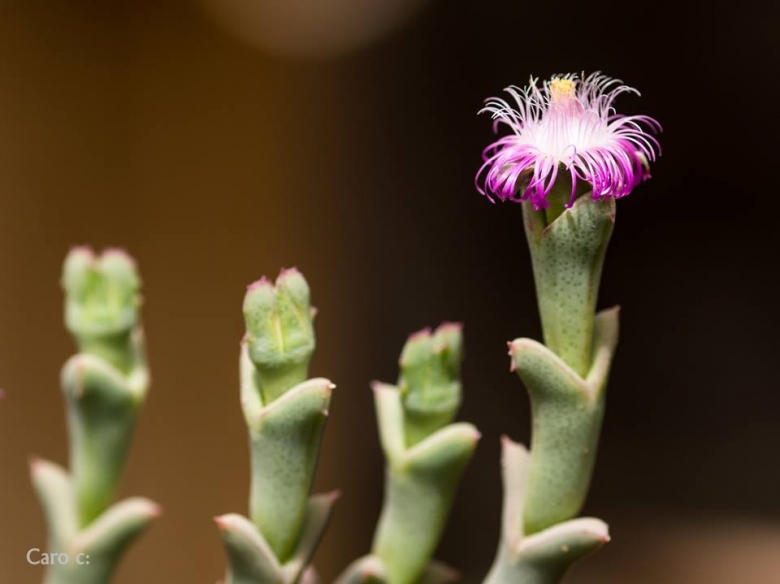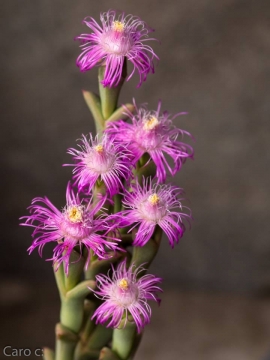Accepted Scientific Name: Ruschia perfoliata (Mill.) Schwantes
Z. Sukkulentenk. ii. 187 (1926).

Mesembryanthemum perfoliatum (Ruschia perfoliata) Photo by: Carolina González
Origin and Habitat: South Africa, Eastern Cape and Western Cape.
Synonyms:
Common Names include:
ENGLISH: perfoliate Mesembryanthema
Description: Ruschia perfoliataSN|33270]]SN|33270]] (Miller) Schwantes (Mesembryanthemum perfoliatumSN|33271]]SN|33271]] Miller) is an erect sparingly branched succulent shrub. The perfoliate mesembryanthema have been known since the 17th century in Europe, but they are still rare in cultivation, probably due to their rather spreading, loose growth requiring some space.
Stems: Semi-woody with some basal branches developing further lateral branches, internodes white with age.
Leaves: 1.1-1.5 cm long, Merging into the stems with 2-2.5 mm long sheaths, the free part 3-angled, spreading protruding, pushed upwards, arrowed towards the hard red tip, keel and margins with 2-4 stout teeth, texture solid, grey to pale reddish grey (depending on sun exposure).
Flowers: c. 2.5 cm in diameter, rose red, solitary, terminal on 2-4 cm long stalk, but several developed on subsequent sections of stems in a season, carpels 5, petals pale purple, filamentous staminodes present.
Fruits: 5 chambered.
Bibliography: Major references and further lectures
1) Hermann Jacobsen “Die Sukkulenten: Beschreibung, Kultur und Verwendung der sukkulenten Gewächse mit Ausnahme der Kakteen. Ein Buch fü r Gärtner und Pflanzenliebhaber” Verlagsbuchhandlung Paul Parey, 1933
2) Hermann Jacobsen “Handbuch der sukkulenten Pflanzen: Mesembryanthemaceae” G. Fischer, 1955
3) Z. Sukkulentenk. 2: 187 (1925).
4) Bradleya 17: 60-61 (1999).
5) Heidrun E.K. Hartmann “Illustrated Handbook of Succulent Plants: Aizoaceae F-Z” Springer Science & Business Media, 2002
6) Rauh. “The wonderful world of succulents”, pl. 95, 1984
7) Stuart Max Walters “European Garden Flora: A Manual for the Identification of Plants Cultivated in Europe, Both Out-of-Doors and Under Glass” Cambridge University Press, 27 lug 1989
8) Burgoyne, P.M. 2006. “Ruschia perfoliata (Mill.) Schwantes.” National Assessment: Red List of South African Plants version 2015.1. Accessed on 2016/12/06
 Mesembryanthemum perfoliatum (Ruschia perfoliata) Photo by: Carolina González
Mesembryanthemum perfoliatum (Ruschia perfoliata) Photo by: Carolina González Mesembryanthemum perfoliatum (Ruschia perfoliata) Photo by: Carolina González
Mesembryanthemum perfoliatum (Ruschia perfoliata) Photo by: Carolina GonzálezCultivation and Propagation: Ruschia perfoliataSN|33270]]SN|33270]] are very hardy floriferous plants occasionallt seen in rockeries. The plants in this genus represent some of the more easily cultivated succulent species. It is tolerant of wet and cold, but it will suffer under prolonged water stagnation, and thus prefers well drained soils, or even rocky terrain.
Soil: It prefers deep, well-drained, lean, sandy, or rocky soils.
Fertilization: Fertilize once early in the growing season with a light sprinkling of all-purpose fertilizer.
Watering: Water moderately from early spring to the end of autumn, and keep the compost quite dry when the plants are dormant watering, only if the plant starts shrivelling (, but they will generally grow even in winter if given water). Disliking overly wet conditions, it is best to also cover it with an anchored sheet of plastic during the winter if climate is particularly wet and cold. During wet seasons allow air circulation.
Exposure: Provide maximum light all the year round.
Hardiness: It is tolerant of both heat and cold and is hardy from zones 7 through 10(-11). In areas prone to very intense frosts, grow in an intermediate greenhouse or conservatory, in pots of cactus compost, obtainable from good garden centres. It may be killed in a very severe winter.
Salt tolerance: High
Propagation: Cuttings. It is easily started by cuttings. Individual pieces of plants sprinkled on a prepared surface will root in a matter a few days.













